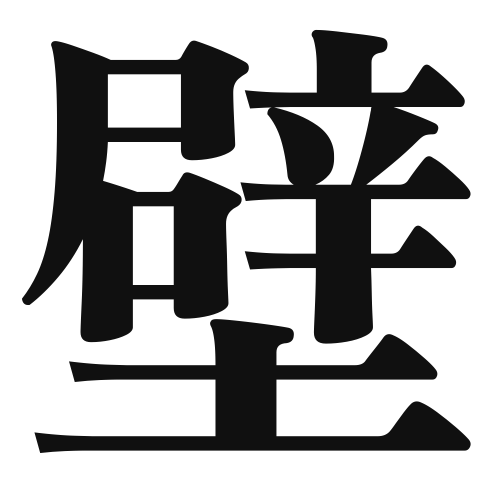1. Overview of Meaning
The kanji “壁” (kabe) means “wall” in English. It refers to a vertical structure that encloses or divides spaces, providing support and protection.
2. Formation and Radicals
The kanji “壁” is a compound character (会意文字) made up of two parts: the radical “土” (earth) and “壁” (to separate). The “土” radical indicates that it is related to something solid or foundational, while the character itself conveys the idea of a barrier or division.
The radical for “壁” is “土,” which signifies earth or ground, emphasizing the physical nature of a wall.
3. Examples of Usage
Common words and phrases that include “壁” are:
- 壁紙 (kabe-gami) – wallpaper
- 壁画 (hekiga) – mural
- 壁際 (kabe-gawa) – wall edge
Example sentences in daily conversation:
- 「この部屋の壁は青いです。」(Kono heya no kabe wa aoi desu.) – “The walls of this room are blue.”
- 「壁に絵を掛けたいです。」(Kabe ni e o kaketai desu.) – “I want to hang a picture on the wall.”
4. Synonyms and Antonyms
Similar kanji with related meanings include:
- 「障壁」(shōheki) – barrier, which implies a more obstructive or protective wall.
- 「塀」(hei) – fence, which is typically lower and used for enclosing outdoor spaces.
Antonyms include:
- 「開放」(kaihō) – openness, which signifies a lack of barriers or walls.
5. Cultural and Historical Background
The concept of “壁” is significant in Japanese culture, often symbolizing boundaries and protection. In traditional Japanese homes, walls are not just physical structures but also represent privacy and security.
Proverbs and idiomatic expressions related to “壁” include:
- 「壁に耳あり、障子に目あり」(Kabe ni mimi ari, shōji ni me ari) – “Walls have ears, and sliding doors have eyes,” meaning that one should be cautious about what they say, as they may be overheard.
